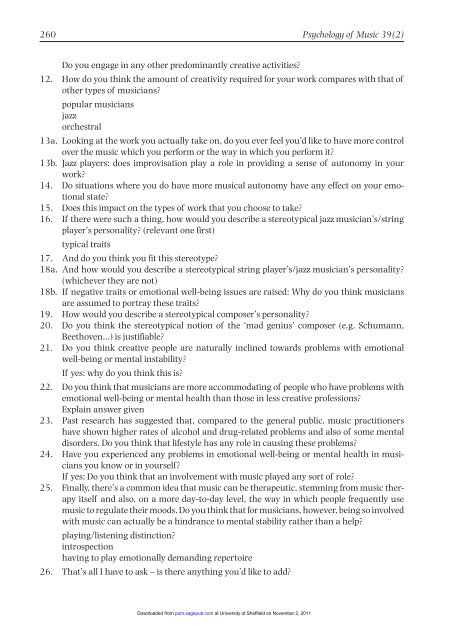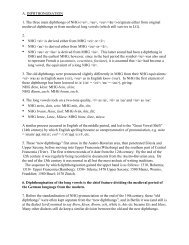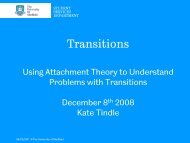Dobson, 2010.pdf - University of Sheffield
Dobson, 2010.pdf - University of Sheffield
Dobson, 2010.pdf - University of Sheffield
You also want an ePaper? Increase the reach of your titles
YUMPU automatically turns print PDFs into web optimized ePapers that Google loves.
260 Psychology <strong>of</strong> Music 39(2)<br />
Do you engage in any other predominantly creative activities?<br />
12. How do you think the amount <strong>of</strong> creativity required for your work compares with that <strong>of</strong><br />
other types <strong>of</strong> musicians?<br />
popular musicians<br />
jazz<br />
orchestral<br />
13a. Looking at the work you actually take on, do you ever feel you’d like to have more control<br />
over the music which you perform or the way in which you perform it?<br />
13b. Jazz players: does improvisation play a role in providing a sense <strong>of</strong> autonomy in your<br />
work?<br />
14. Do situations where you do have more musical autonomy have any effect on your emotional<br />
state?<br />
15. Does this impact on the types <strong>of</strong> work that you choose to take?<br />
16. If there were such a thing, how would you describe a stereotypical jazz musician’s/string<br />
player’s personality? (relevant one first)<br />
typical traits<br />
17. And do you think you fit this stereotype?<br />
18a. And how would you describe a stereotypical string player’s/jazz musician’s personality?<br />
(whichever they are not)<br />
18b. If negative traits or emotional well-being issues are raised: Why do you think musicians<br />
are assumed to portray these traits?<br />
19. How would you describe a stereotypical composer’s personality?<br />
20. Do you think the stereotypical notion <strong>of</strong> the ‘mad genius’ composer (e.g. Schumann,<br />
Beethoven…) is justifiable?<br />
21. Do you think creative people are naturally inclined towards problems with emotional<br />
well-being or mental instability?<br />
If yes: why do you think this is?<br />
22. Do you think that musicians are more accommodating <strong>of</strong> people who have problems with<br />
emotional well-being or mental health than those in less creative pr<strong>of</strong>essions?<br />
Explain answer given<br />
23. Past research has suggested that, compared to the general public, music practitioners<br />
have shown higher rates <strong>of</strong> alcohol and drug-related problems and also <strong>of</strong> some mental<br />
disorders. Do you think that lifestyle has any role in causing these problems?<br />
24. Have you experienced any problems in emotional well-being or mental health in musicians<br />
you know or in yourself?<br />
If yes: Do you think that an involvement with music played any sort <strong>of</strong> role?<br />
25. Finally, there’s a common idea that music can be therapeutic, stemming from music therapy<br />
itself and also, on a more day-to-day level, the way in which people frequently use<br />
music to regulate their moods. Do you think that for musicians, however, being so involved<br />
with music can actually be a hindrance to mental stability rather than a help?<br />
playing/listening distinction?<br />
introspection<br />
having to play emotionally demanding repertoire<br />
26. That’s all I have to ask – is there anything you’d like to add?<br />
Downloaded from<br />
pom.sagepub.com at <strong>University</strong> <strong>of</strong> <strong>Sheffield</strong> on November 2, 2011

















